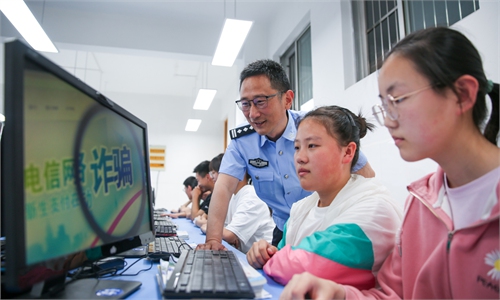China’s three major telecom operators unveil strong H1 results, highlighting innovation

A concept photo of 6G technology Illustration: VCG
China's three major telecom operators China Mobile, China Unicom and China Telecom have released their business performance reports for the first half of 2023, highlighting positive growth driven by innovation.
Against the backdrop of the nation's ramped-up efforts in digital transformation and technology development, the rising innovation and application of digital products and services including 5G and computing power networks have been a driving force for the companies' growth.
In its business report for the first half of this year released on Thursday, China Mobile said its revenue reached 530.72 billion yuan ($73.62 billion), an increase of 6.8 percent year-on-year.
The company's net profits also jumped to 76.173 billion yuan, an increase of 8.4 percent year-on-year. It is worth noting that the digital transformation in some new areas such as 5G played an increasingly important role in boosting its business profitability.
China Mobile's revenue from digital transformation reached 132.6 billion yuan, a year-on-year increase of 19.6 percent. It contributed 84.1 percent to the increase in communication service revenue and accounted for 29.3 percent of communication service revenue.
In the first half of this year, in the face of difficulties and challenges such as insufficient macro demand and a complex external environment, the company grasped the precious opportunities of the vigorous development of the digital economy, and systematically built up a platform based on 5G and computing power, Executive Director and Chairman Yang Jie said on Thursday.
Dong Xin, CEO of China Mobile, said at the semi-annual performance meeting that 6G is a leap in technological development from 5G.
"The industry chain should jointly prepare for technological evolution and platform application reserves," Dong said, predicting that full commercial use of 6G should come around 2028.
China Mobile's half-year business report came just a day after China Unicom released its corresponding report, which had equally eye-catching performance.
In the first half, China Unicom's revenue and profit set new records since its listing. Its operating income reached 191.833 billion yuan, an increase of 8.8 percent year-on-year.
During this period, China Unicom's mobile business achieved an increase in scale and value and the penetration rate of 5G package users exceeds 70 percent, according to the company's report.
The cumulative number of 5G virtual private network service customers exceeded 5,800, and the contracted value of 5G business reached 6.2 billion yuan, the report said.
In the first half of the year, China Unicom's R&D investment intensity reached 2.94 percent, leading the industry, and the number of authorized patents reached 1,326, a year-on-year increase of 70 percent.
Driven by digital transformation, China Telecom's operating income jumped by 7.7 percent, reaching 258.679 billion yuan in the first half of the year. There was also double-digit growth in net profit.
The main reason for the business growth was due to the company grasping the strategic opportunities for digital economic development, China Telecom said. Key innovative sectors such as artificial intelligence and cloud computing are the main focus.
In the face of the rapid development of AI technology, China Telecom said that the company is seizing the breakthrough development opportunities of this new technology, focusing on data and algorithms to strengthen its AI capabilities and empower digital applications.
The company pledged to continue deepening the independent R&D into core AI technology in the future.
In 2022, China's digital economy reached a scale of 50.2 trillion yuan, ranking second in the world in terms of total value.
Moreover, the integration of digital technology and the real economy has been deepening, with the government looking to comprehensively empower economic and social development via strengthening, optimizing, and expanding the digital economy.
Policy stimulus involves nurturing and expanding digital industries such as industrial internet and blockchain, and AI has been introduced in order to create internationally competitive digital industry clusters.

